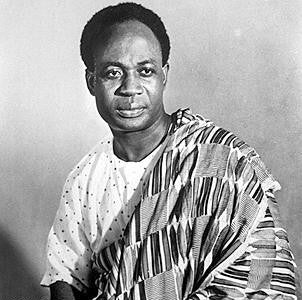
How the CIA ousted Africa's visionary leader Dr Kwame Nkrumah
The first President of Ghana, Osagyefo Dr Kwame Nkrumah, was unconstitutionally ousted from office through a military and police coup d’état on February 24, 1966. This year marks exactly 50 years since the Convention People’s Party (CPP) government was overthrown.

According to declassified documents from the Central Intelligence Agency (CIA) in 1999, the then US government had been trying to influence some people to overthrow President Nkrumah since 1964.
Apparently, Dr Nkrumah was seen as an ally of the then Soviet Union and Eastern Europe during the ‘Cold War’. But the pan-Africanist leader declared his stance and made the famous statement: “We neither face East nor West; we face forward.”
On February 21, 1966, President Nkrumah left Ghana for Hanoi, the Democratic Republic of North Vietnam, at the invitation of President Ho Chi Minh to resolve the Vietnam War. Ghana was left under the control of a three-man Presidential Commission.
Consequently, the CIA-backed coup in Ghana was carried out at the dawn of February 24, 1966, while Nkrumah was still on a peace mission in Asia.
Among the key figures who staged the revolution were Col. E.K. Kotoka, Major A.A. Afrifa and the then Inspector-General of Police, Mr J.W.K. Harley.
The famous coup-makers cited Nkrumah’s Preventive Detection Act, corruption, dictatorial practices, oppression and the deteriorating economy of Ghana as the principal reasons for the uprising.
In the early hours of February 24, 1966, Col. Kotoka announced on the state radio that “Kwame Nkrumah is overthrown, and the myth surrounding him is broken.”
What happened after overthrow?
Let me ask the burning question. How did the overthrow of Nkrumah contribute towards national development? Did the country’s fortunes improve after Nkrumah’s government was toppled? Well, your guess is as good as mine.
Regrettably, the long-term goals, policies and vision of Kwame Nkrumah became a mirage, to say the least. Many Ghanaians took to the street and jubilated over the first infamous revolution which forced Dr Nkrumah into political asylum until his death on April 27, 1972.
Like every human, Nkrumah had his strengths, weaknesses, achievements, failure or downfall.
For instance, the one-party state Nkrumah created in the CPP, the declaration of ‘Presidency for Life’ by Osagyefo, and the imprisonment of opposition members without trial were quite unfortunate.
Meanwhile, some political analysts and historians have justified the Preventive Detention Act (PDA) which was passed into law in 1958. The Act empowered Nkrumah to imprison his ‘enemies’ (opponents) without trial for up to five years (later extended to 10 years).
The PDA was described as a necessary evil because of the spate of bomb attacks and assassination attempts on Osagyefo’s life. Besides, the best way to defend is to attack. There were at least seven attempts to assassinate him during his presidency.
Today, there is a paradigm shift in our history. Kwame Nkrumah, who was once vilified by his own people following the 1966 coup, is now credited for exemplary leadership in Ghana and Africa as a whole.
Written by ASP James Annan. {Accra Regional PRO, Senior Correctional Centre.}
